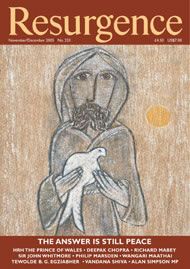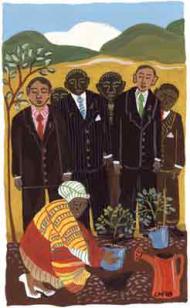WE CAN TRULY say that this prize is in recognition of our collective work as grassroots people. We work because we are committed and we believe in what we do.
Many people have been asking, "What is the connection between democracy, the environment and peace?" Those people are used to thinking of these three themes separately. If they are talking development, they only talk about development. If they are talking about peace, they talk only of peace and they don't talk about development. If they are talking about development they only talk about development and they don't talk about the environment or even about democracy! But many of us, when we are out there in the field, do recognise that when you are trying to do this work to really have a long lasting impact you need to have a holistic approach.
Now when I first started I did not have that approach myself. Between 1973 and1974, I was in the National Council of Women. I listened to the problems of Kenyan women: "We need clean drinking water." "We need firewood [their main source of energy]." "We need food." "We need building materials." "We need fencing materials." "We need to protect our soils." The more I listened to those issues, the more I connected them to the land.
Then I asked the women, "Why can't we plant trees?" and they said, "We don't know how to plant trees." I decided to solicit the support of foresters. I went to the Conservator of Forests, who said we could have all the trees we wanted. Later the Conservator changed his mind because we were collecting more trees than he could afford to give us free of charge, so he asked us to pay for those trees.
Eventually, we decided that instead of spending too much time and money collecting seedlings from the foresters we would ask them how to establish our own tree nurseries. The women were creative and established tree nurseries as best they could. They nurtured those seedlings until they were about a foot or two high and then they planted them on their own land.
They needed to take care of those trees. Once the trees had survived, the Green Belt Movement would compensate them with a little money that we had fund-raised. This became a transformation for the women because the tree-planting became an income-generating activity. You could put money in the hands of women because they had raised several thousand trees. And although the money was very little per tree, when you multiply that several thousand times women could make enough to pay school fees, to buy clothing and to meet some other domestic needs, which was wonderful. That became a very important token and a very important reason for them to plant trees. When they had planted the trees on their farms we said, "Now talk to your neighbours. Tell them why they should plant trees. And give them trees free of charge. And when they have planted and the trees have survived they will be compensated for the work they have done."
Fortunately, in the tropics, trees grow very fast. So within a very short time trees grow up; they become tall. And it becomes a very interesting experience for those who plant because it's as if trees talk to them. They become their own ambassadors. As the trees grow they give hope, they give self-confidence, they transform the land. Once the landscape is transformed even birds come back, smaller animals come back; there is not so much dust; as you walk along the path there is shade; and suddenly there is a good feeling in the community. And you don't have to persuade them any more to plant trees. They know the value of trees.
NOW THAT WOULD have been a wonderful experience if that was all we did. And that, in many ways, is all that people see - women planting trees. And so people ask, "Why would anybody arrest a woman, beat her up, or put her in jail for planting trees?" Now, the reason why I got myself into trouble is that I realised that you need to mobilise a lot of women, a lot of men and children; that you can never really make an impact if you do not have a very large number of people involved.
So we decided we must educate people. We set up a Civic and Environmental Education programme. We wanted to make people internalise the many reasons why trees are important to us, both in protecting the environment and in helping us meet our own needs. And that's when I was first confronted with violation of human rights, because the government said, "You can meet, but if you are more than nine, you need a licence." And I said, "Why would I need a licence to talk to another person, to persuade that person to dig a hole and plant a tree?" And the government said, "Because that's the law. Nobody is allowed to gather more than nine people."
Now that definitely was the beginning for me in understanding the role that democracy plays in maintaining, protecting or destroying the environment. So we decided to challenge that law. We decided to say we must have the freedom to meet, the freedom to move from one place to the other, freedom to associate. But instead of talking about it we acted it out. We met where we had the tree nursery and we insisted that we have a right to meet and discuss the possibilities of protecting our environment and improving our environment. Well, occasionally we would be beaten, we would be disrupted and we would be refused permission to meet. But in order to help women, so that they are not too disempowered by these disruptions, we advised them to go and register as societies or as groups. (The government allows groups to have a licence to meet.)
We then saw the need to intensify the education on governance. In the course of our studying we realised that one of the reasons that the politicians did not want us to get together to inform each other is that they were some of the most destructive members of society! They logged illegally in the forest, they privatised forests, they stole from the treasury: they practised corruption at every possible opportunity. So we knew that what they really did not want us to understand was how they govern us and why we are governed that way.
By studying and understanding the structure we decided that one thing we must do is change that structure. But we knew we could not change that structure with that government in place. So we started working on how we would change that government. And we knew that one way to change that government would be to participate in the elections. So we started preparing how we could all participate in the elections and try to put in power people we could trust: people who have their integrity in place - because we learnt that if you don't have people of integrity in power, they destroy the environment. We did it under the pretence that all we were doing was planting a tree. And quite often when the government came where we had gathered, it would say, "We know you have a licence to meet, but what are you talking about?" and we would say, "We are talking about how to plant trees effectively." And so we became part of the pro-democracy movement in Kenya.
GOOD MANAGEMENT OF the environment is linked to democratic governance. We also saw that when you have bad governance it thrives because it is able to create factions among communities. In Africa it is able to set one tribe against another tribe. This usually happens very easily between, for example, farming communities and pastoral communities.
If you look throughout the world today and assess the reasons why many people are fighting in different parts of the world, in Africa and elsewhere, you will find that most people are fighting over natural resources. When people are fighting over those resources, because bad governance facilitates it or allows it, there can be no development.
You cannot develop in a country where there is no peace. You cannot develop a country that does not respect democratic principles. And you cannot develop in a country where resources are being mismanaged, are being stolen, are being put in the hands of a few at the expense of many.
The challenge that the Nobel Peace Committee has given us is to shift our thinking, to shift the way we perceive the themes of environment, democracy and peace. To begin to understand that these themes are intricately interwoven; that you can't deal with the one without the other.
This prize is also a chall-enge, especially to the African leadership. The leadership of Africa needs to rethink its role and give Africa a chance by representing the people of Africa properly. It is important for us to develop leadership in Africa that promotes good governance, promotes good management of the natural resources, prevents conflicts, and allows the children of Africa to grow and become adults and raise families instead of being shot in the front line fighting battles they do not understand.
So I am hoping that our leaders will embrace this. We are seeing good signs such as what is happening in East Africa and in West Africa. Leaders are willing to spend money for development instead of weapons. If this prize can sensitise us in Africa, if it can sensitise our leaders, then we can begin a new era where our leaders are in the forefront, protecting the vulnerable, protecting the people who trust them, and leading them to a better future. And if we in Africa do that, and the whole world is thinking with this new consciousness, then I know for sure that we shall have laid a new ground for development and we shall be able to move forward. o
This is an extract from Wangari Maathai's Nobel Prize Acceptance Speech, given at the Nobel Peace Prize ceremony on 12th December 2004 at Oslo City Hall. Copyright: Nobel Foundation 2004. To read the whole speech visit www.wangarimaathai.com, or to see a video version visit nobelprize.org/peace/laureates/2004/maathai-lecture.html
For further discussion on environment and development issues in Africa, see the report Africa: Up in Smoke? www.neweconomics.org







